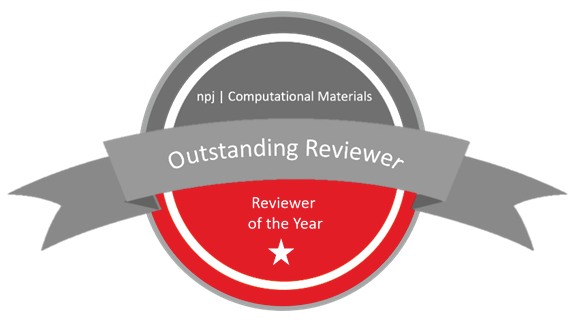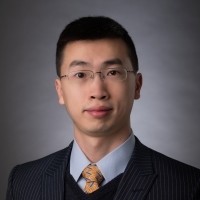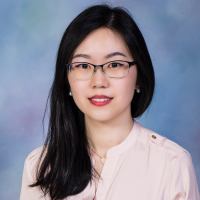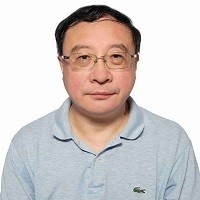Reviewer of the Year
Beginning in 2022, our editors will select a few of our outstanding referees each year to be featured as Reviewer of the Year.
 Our featured reviewers are those who have:
Our featured reviewers are those who have:
made a significant and positive contribution to the peer review process, regardless of whether the paper was eventually accepted by the journal;
taken both a broad and detailed view of the paper;
demonstrated professionalism and compassion in their reviews; and
provided comments that truly help the authors to improve their work.
We must note that, while it is our opinion that these referees have provided exceptional reviews, many of our referees meet the above criteria and we regret that we cannot recognize each of them publicly here. We are equally grateful to all of the individuals who agree to review for npj Computational Materials, thereby helping to strengthen the scientific record. We hope that by highlighting a few of our most outstanding referees, we can bring attention to the valuable contributions of peer reviewers to the scientific process.
Aldo Romero, PhD
 Aldo Romero is an Eberly Distinguished Professor and the director of research computing at West Virginia University. His research is an intersection of materials discovery, artificial intelligence, and state of the art ab-initio methods. His research interest ranges from electronic, magnetic, thermal, and structural characterization of materials. He has applied and developed different techniques on many material families, from superconductors, magnetic materials, multiferroics, and superhard materials to topological materials. At West Virginia University, he keeps a research group that, in addition to his interest in materials discovery, also keeps several computational packages broadly used in the community, such as PyProcar, MechElastic, DMFTwDFT, and PyChemia. He is also the chair of the international advisory committee of ABINIT, one of the most crucial electronic structure packages used worldwide. His current research focused on developing methods to generate novel low-dimensional materials with unusual properties. In that respect, his group has been creating different databases accessible to the community, such as 2D materials database, 2D Magnetic constants database, magnetoelastic properties of materials, etc. He teaches graduate and undergraduate physics courses and supervises several Ph.D. theses. You can find him on LinkedIn: https://www.linkedin.com/in/aldo-h-romero-34740b2/.
Aldo Romero is an Eberly Distinguished Professor and the director of research computing at West Virginia University. His research is an intersection of materials discovery, artificial intelligence, and state of the art ab-initio methods. His research interest ranges from electronic, magnetic, thermal, and structural characterization of materials. He has applied and developed different techniques on many material families, from superconductors, magnetic materials, multiferroics, and superhard materials to topological materials. At West Virginia University, he keeps a research group that, in addition to his interest in materials discovery, also keeps several computational packages broadly used in the community, such as PyProcar, MechElastic, DMFTwDFT, and PyChemia. He is also the chair of the international advisory committee of ABINIT, one of the most crucial electronic structure packages used worldwide. His current research focused on developing methods to generate novel low-dimensional materials with unusual properties. In that respect, his group has been creating different databases accessible to the community, such as 2D materials database, 2D Magnetic constants database, magnetoelastic properties of materials, etc. He teaches graduate and undergraduate physics courses and supervises several Ph.D. theses. You can find him on LinkedIn: https://www.linkedin.com/in/aldo-h-romero-34740b2/.
When asked about peer review, Prof. Romero says, “Being a peer reviewer of npj Computational Materials gave me very satisfactory experiences. The reviewer establishes constructive communication with authors, it learns exciting science from colleagues, but at the same time, the review process must guarantee the publication quality of the journal.”
Bo Wang, PhD
 Dr. Bo Wang is a Postdoctoral Research Staff at the Lawrence Livermore National Laboratory in USA. He holds a PhD in Materials Science and Engineering with a minor in Computational Science from The Pennsylvania State University (USA) and a Bachelor of Science in Materials Physics at Dalian University of Technology (China). He was trained as a Computational Materials Scientist, focusing on understanding the microstructure formation and evolution and the microstructure-property relationship of various materials to optimize their overall performance by employing mesoscale modelling and simulation techniques as well as first-principles calculations. Particularly, Dr. Wang is interested in functional materials such as piezoelectric crystals and ferroelectric thin films and energy materials for electrodes and solid electrolytes of Li batteries. Dr. Wang has authored or co-authored more than 50 publications and presented at more than 20 conferences or invited lectures. In 2020, he received the Gold Award of Materials Research Society Graduate Student Awards.
Dr. Bo Wang is a Postdoctoral Research Staff at the Lawrence Livermore National Laboratory in USA. He holds a PhD in Materials Science and Engineering with a minor in Computational Science from The Pennsylvania State University (USA) and a Bachelor of Science in Materials Physics at Dalian University of Technology (China). He was trained as a Computational Materials Scientist, focusing on understanding the microstructure formation and evolution and the microstructure-property relationship of various materials to optimize their overall performance by employing mesoscale modelling and simulation techniques as well as first-principles calculations. Particularly, Dr. Wang is interested in functional materials such as piezoelectric crystals and ferroelectric thin films and energy materials for electrodes and solid electrolytes of Li batteries. Dr. Wang has authored or co-authored more than 50 publications and presented at more than 20 conferences or invited lectures. In 2020, he received the Gold Award of Materials Research Society Graduate Student Awards.
Corey Oses, PhD
 Corey Oses, an assistant professor of materials science and engineering at Johns Hopkins University, leads the Entropy for Energy laboratory focusing on the discovery of materials for clean and renewable energy. Specifically, Oses looks to leverage the stabilizing effects of disorder to innovate clean hydrogen production, waste-heat conversion, and electric grid technologies. He completed his bachelor’s degree in applied and engineering physics from Cornell University in 2013 and his PhD in materials science from Duke University in 2018. Oses is also a lead developer of the aflow++ software framework for autonomous materials design. More information can be found at entropy4energy.ai.
Corey Oses, an assistant professor of materials science and engineering at Johns Hopkins University, leads the Entropy for Energy laboratory focusing on the discovery of materials for clean and renewable energy. Specifically, Oses looks to leverage the stabilizing effects of disorder to innovate clean hydrogen production, waste-heat conversion, and electric grid technologies. He completed his bachelor’s degree in applied and engineering physics from Cornell University in 2013 and his PhD in materials science from Duke University in 2018. Oses is also a lead developer of the aflow++ software framework for autonomous materials design. More information can be found at entropy4energy.ai.
Regarding peer review, Dr. Oses says, "I review for npj Computational Materials to support the community pioneering computational and data-driven materials design. I also strongly support the open-access model which makes science free and accessible to a diverse audience. I hope for npj Computational Materials to continue inspiring and promoting future generations of scientists in this field.”
Debangshu Mukherjee, PhD
 Debangshu Mukherjee works as a Research Scientist in the Computational Sciences & Engineering Division at Oak Ridge National Laboratory. He earned his PhD from The Pennsylvania State University in 2018, where he specialized in electron microscopy studies of ferroelectric oxides. Additionally, he has a keen interest in developing open-source computational packages for microscopy analysis. His present research emphasizes the analysis and simulation of big data in microscopy, particularly employing the 4D-STEM technique for strain quantification and electron ptychography. A significant portion of his current efforts is dedicated to microscope automation, specifically utilizing AI-based methods for swift analysis of microscopy data to facilitate steering and feedback.
Debangshu Mukherjee works as a Research Scientist in the Computational Sciences & Engineering Division at Oak Ridge National Laboratory. He earned his PhD from The Pennsylvania State University in 2018, where he specialized in electron microscopy studies of ferroelectric oxides. Additionally, he has a keen interest in developing open-source computational packages for microscopy analysis. His present research emphasizes the analysis and simulation of big data in microscopy, particularly employing the 4D-STEM technique for strain quantification and electron ptychography. A significant portion of his current efforts is dedicated to microscope automation, specifically utilizing AI-based methods for swift analysis of microscopy data to facilitate steering and feedback.
Dr. Mukherjee discusses the significance of peer review in the context of npj Computational Materials, stating, "I firmly believe that peer review is a crucial aspect of contemporary science, serving as a vetting mechanism. In all the papers I've authored, I've found that peer review has been incredibly beneficial. This process ensures that the ideas I present in my papers are effectively communicated. As a reviewer, my approach is similar – I strive to comprehend the message the authors intend to convey and assess if their data substantiates that message. My role as a reviewer is not to act as a critic, but rather to assist the authors in enhancing their paper by addressing any overlooked areas within the manuscript."
Dierk Raabe, PhD
 Dierk Raabe studied music, metallurgy and metal physics. After his doctorate 1992 and habilitation 1997 at RWTH Aachen he received a Heisenberg fellowship of the German Research Foundation and worked as postdoc at Carnegie Mellon University (Pittsburgh, USA) and at the National High Magnet Field Lab (Tallahassee, USA). He joined Max Planck Society as a director in 1999. His interests are in computational materials science, sustainable metallurgy, phase transformation, alloy design, hydrogen and atom probe tomography. He received the Gottfried Wilhelm Leibniz Award of the German Science Foundation, two ERC Advanced Grants and the Acta Materialia Gold Medal Award. He is a professor at RWTH Aachen in Germany and honorary professor at KU Leuven in Belgium. He holds an honorary doctorate degree of the Norwegian University of Science and Technology in Trondheim and is a member of the German National Academy Leopoldina.
Dierk Raabe studied music, metallurgy and metal physics. After his doctorate 1992 and habilitation 1997 at RWTH Aachen he received a Heisenberg fellowship of the German Research Foundation and worked as postdoc at Carnegie Mellon University (Pittsburgh, USA) and at the National High Magnet Field Lab (Tallahassee, USA). He joined Max Planck Society as a director in 1999. His interests are in computational materials science, sustainable metallurgy, phase transformation, alloy design, hydrogen and atom probe tomography. He received the Gottfried Wilhelm Leibniz Award of the German Science Foundation, two ERC Advanced Grants and the Acta Materialia Gold Medal Award. He is a professor at RWTH Aachen in Germany and honorary professor at KU Leuven in Belgium. He holds an honorary doctorate degree of the Norwegian University of Science and Technology in Trondheim and is a member of the German National Academy Leopoldina.
Regarding peer review, Prof. Raabe says, "I work with great interest as a peer reviewer for high quality journals. The selfish reason is that it often allows one to read exiting work from excellent colleagues at an early stage. Another reason is that the flood of journals and publications is so large these days that only we as a community can ensure real quality control. In this respect, we have a responsibility to provide our expertise to the community as reviewers. I believe that good scientists recognize good science, and that is the prerequisite for achieving high-quality publications that can truly advance science.”
Nicole Adelstein, PhD
 The Adelstein Materials Research Group uses computational tools to understand and improve materials used in renewable energy technologies, with the goal of reducing fossil fuel usage and climate change. The group is currently studying ionic diffusion in solid-state materials using first-principles and classical molecular dynamics simulations. In particular, simulations of Li-ion diffusion in various promising materials allow the group to generalize descriptors of fast diffusion. Our goal is to control and predict superionic electrolytes for novel batteries that will revolutionize our energy technologies. We seek fundamental insights into ionic diffusion in materials and the relationship between superionic (fast) diffusion and the structure of the materials. We have recently started a collaboration with Professor Jingjing Qiu (SFSU) to study Ni-catalysts for the oxygen evolution reaction to cleaning produce hydrogen fuel from splitting water. Find more about Adelstein Materials Research Group: https://nadelstein.github.io/ResearchGroup/
The Adelstein Materials Research Group uses computational tools to understand and improve materials used in renewable energy technologies, with the goal of reducing fossil fuel usage and climate change. The group is currently studying ionic diffusion in solid-state materials using first-principles and classical molecular dynamics simulations. In particular, simulations of Li-ion diffusion in various promising materials allow the group to generalize descriptors of fast diffusion. Our goal is to control and predict superionic electrolytes for novel batteries that will revolutionize our energy technologies. We seek fundamental insights into ionic diffusion in materials and the relationship between superionic (fast) diffusion and the structure of the materials. We have recently started a collaboration with Professor Jingjing Qiu (SFSU) to study Ni-catalysts for the oxygen evolution reaction to cleaning produce hydrogen fuel from splitting water. Find more about Adelstein Materials Research Group: https://nadelstein.github.io/ResearchGroup/
When asked about being a reviewer for npj Computational Materials, Dr. Adelstein says, “I choose to Review for npj Computational Materials because many impactful papers in my field of computational materials science are published in this journal. As a reviewer, I like to provide meaningful feedback to writers and see what my fellow researchers think is cutting-edge research before its even published”.
Jian Zhou, PhD
 Jian Zhou is a Professor in School of Materials Science and Engineering at Xi’an Jiaotong University, China. Prior to this, he received his Bc.S. and Ph.D. in Mechanics from Peking University, following by postdoctoral appointments at Virginia Commonwealth University and Massachusetts Institute of Technology. His research interests lie in the theoretical and computational understanding of geometric and electronic behaviors and potential applications of various functional materials, such as optical responses, topological characters, spintronics, and valleytronics. He has authored over 100 peer-reviewed papers with over 6,000 citations, honored as “Most Cited Chinese Researcher (MSE)” by Elsevier. He also serves as Editorial Youth Committee Member of Acta Physico-Chimica Sinica.
Jian Zhou is a Professor in School of Materials Science and Engineering at Xi’an Jiaotong University, China. Prior to this, he received his Bc.S. and Ph.D. in Mechanics from Peking University, following by postdoctoral appointments at Virginia Commonwealth University and Massachusetts Institute of Technology. His research interests lie in the theoretical and computational understanding of geometric and electronic behaviors and potential applications of various functional materials, such as optical responses, topological characters, spintronics, and valleytronics. He has authored over 100 peer-reviewed papers with over 6,000 citations, honored as “Most Cited Chinese Researcher (MSE)” by Elsevier. He also serves as Editorial Youth Committee Member of Acta Physico-Chimica Sinica.
Regarding npj Computational Materials and peer review, Dr. Zhou says, "npj Computational Materials is a prestigious journal that publishes selective papers that would boost the cutting-edge knowledge to understand the behavior of materials and their rational design. As a peer reviewer, one’s target is to help both the journal and the authors to enhance their work quality, so that deepen its impact in the field.”
Yanzhou Ji, PhD
 Yanzhou Ji is currently an assistant research professor in the Department of Materials Science and Engineering, The Pennsylvania State University. His research focuses on materials microstructure modeling using phase-field and multiscale computational approaches. He has been applying these approaches to understanding precipitation and oxidation behaviors in metallic alloys, grain growth during metal additive manufacturing, and chemical vapor deposition of 2D materials, providing guidance for microstructure optimization and materials design. Recently, he is also interested in developing computational models to understand microstructure behaviors at electrode/electrolyte interfaces of energy materials. Starting from August 2023, Yanzhou will join the Department of Materials Science and Engineering at The Ohio State University as a tenure-track Assistant Professor: https://mse.osu.edu/news/2023/04/yanzhou-ji-joins-materials-science-and-engineering-faculty-roster
Yanzhou Ji is currently an assistant research professor in the Department of Materials Science and Engineering, The Pennsylvania State University. His research focuses on materials microstructure modeling using phase-field and multiscale computational approaches. He has been applying these approaches to understanding precipitation and oxidation behaviors in metallic alloys, grain growth during metal additive manufacturing, and chemical vapor deposition of 2D materials, providing guidance for microstructure optimization and materials design. Recently, he is also interested in developing computational models to understand microstructure behaviors at electrode/electrolyte interfaces of energy materials. Starting from August 2023, Yanzhou will join the Department of Materials Science and Engineering at The Ohio State University as a tenure-track Assistant Professor: https://mse.osu.edu/news/2023/04/yanzhou-ji-joins-materials-science-and-engineering-faculty-roster
Regarding npj Computational Materials and peer review, Dr. Ji says, “I believe peer review is essential for the quality and integrity of scientific research. This is especially true for npj Computational Materials, which is a “flagship” journal in the area of computational materials science. As a reviewer of the journal, I feel it is my responsibility to provide comprehensive and constructive feedbacks for the authors to improve their manuscripts. I myself also benefit greatly from the peer review process by keeping track of the most recent progresses in the related research areas.”
Yimo Han, PhD
 Yimo Han is currently an assistant professor of Materials Science and NanoEngineering at Rice University. She completed her B.S. in Physics from Tsinghua University and earned her Ph.D. in Applied Physics from Cornell University. Following her doctoral studies, Dr. Han conducted postdoctoral research for two years in the Department of Molecular Biology at Princeton University. In July 2020, she established her own research laboratory in the Department of Materials Science and NanoEngineering. Dr. Han's research is primarily centered on electron microscopy and the characterization of nanomaterials. Learn more about her group: http://hanlab.blogs.rice.edu/. Twitter: @han_yimo
Yimo Han is currently an assistant professor of Materials Science and NanoEngineering at Rice University. She completed her B.S. in Physics from Tsinghua University and earned her Ph.D. in Applied Physics from Cornell University. Following her doctoral studies, Dr. Han conducted postdoctoral research for two years in the Department of Molecular Biology at Princeton University. In July 2020, she established her own research laboratory in the Department of Materials Science and NanoEngineering. Dr. Han's research is primarily centered on electron microscopy and the characterization of nanomaterials. Learn more about her group: http://hanlab.blogs.rice.edu/. Twitter: @han_yimo
Regarding peer review, Dr. Han says, "serving as a reviewer for npj Computational Materials is a fulfilling and gratifying experience. Reviewing manuscripts is both a responsibility and a privilege that I enjoy.”
Yang Xiang, PhD
 Yang Xiang is a Professor in the Department of Mathematics, Hong Kong University of Science and Technology (HKUST). He is also Chair of Scientific Computation Concentration of HKUST, and Director of Algorithms of Machine Learning and Autonomous Driving Research Lab at HKUST Shenzhen-Hong Kong Collaborative Innovation Research Institute. Prof. Xiang’s research focuses on modeling, simulation, and analysis of defects in crystalline materials, including dislocations, grain boundaries, and epitaxial surfaces. He is also working on the development of machine learning methods for solving PDE models in materials science and other application fields. He was a plenary speaker at the SIAM conference on Mathematical Aspects of Materials Science in 2021.
Yang Xiang is a Professor in the Department of Mathematics, Hong Kong University of Science and Technology (HKUST). He is also Chair of Scientific Computation Concentration of HKUST, and Director of Algorithms of Machine Learning and Autonomous Driving Research Lab at HKUST Shenzhen-Hong Kong Collaborative Innovation Research Institute. Prof. Xiang’s research focuses on modeling, simulation, and analysis of defects in crystalline materials, including dislocations, grain boundaries, and epitaxial surfaces. He is also working on the development of machine learning methods for solving PDE models in materials science and other application fields. He was a plenary speaker at the SIAM conference on Mathematical Aspects of Materials Science in 2021.
